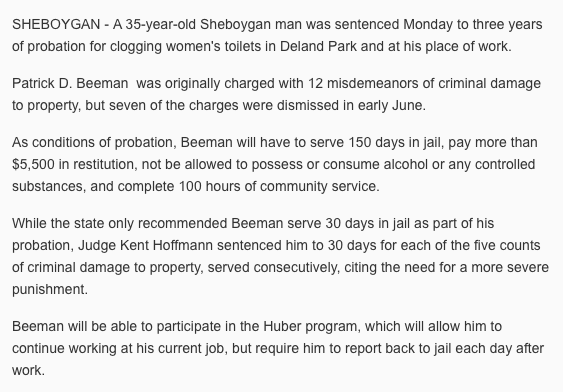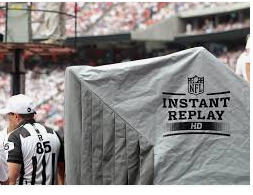The Nutmeg Lawyer Returns, again.
Posted by Cliff Tuttle| July 21, 2019 | © 2025
No. 1,634
Yes, the Nutmeg Lawyer is back. Click the link and bookmark it. It will save you some trouble getting back, since prior incarnations of the blog (except the first one) are still on line.
What happened to the first one? We bloggers used to have to watch out for claim jumpers, just like in the wild, wild west. If you didn’t renew your URL on time and it is a popular one, somebody can reserve it for themselves. Then, anybody who goes there will be greeted with a screen full of ads to purchase more stuff. They have since changed the rules a bit, I hear. Too bad. The original contained a lot of very funny material, lost forever.
CLT
Here’s One For the Nutmeg Lawyer: Serial Toilet Clogging!
Posted by Cliff Tuttle| July 4, 2019 | © 2025
No. 1,633
I miss the Nutmeg Lawyer, the funniest legal blog of all time. Here’s a a plum of a news story from the Nutmeg State (Connecticut) that Adrian Barron would have been all over. Unfortunately, Mr. Baron has been so busy unclogging the court dockets that he hasn’t had the time to post since March 19, 2018. If you are still out there, Adrian, you can post on my blog anytime you want.
Here is a slightly edited story from the Sheboygan Press. Although this one involves a criminal crime spree, the subject of toilet clogs is a major issue in landlord and tenant cases.



CLT
What is a Unicorn?
Posted by Cliff Tuttle| July 4, 2019 | © 2025
No. 1,632

I’ve been running across references to unicorns in books, blog posts and even in the funny papers. Sometimes the author assumes we know what she is talking about or explains the term in a cursory fashion.
In her book, Insight, therapist Tasha Urich used the term “unicorns” to discuss people who greatly improve their self awareness and through this insight achieve success in life. But, when reading this, I remembered other references to unicorns and wondered whether there is a common denominator.
We all know about the mythical beast, usually depicted as a white horse, but occasionally as a goat. Even ten year olds know that these are a product of the imagination.
Unicorns are a rare and wonderous phenomenon. In literature and fable it is associated with feminine virtue such as innocence.
Unicorns in fairy tales and other fantasy stories are magical. They are, for example, important figures in the Harry Potter saga. Lord Voldemort was kept alive by drinking unicorn blood, a mystical, silvery substance. Later, it was used in a potion to create a temporary body for Voldemort. But a person who consumed unicorn’s blood thereafter lived a cursed life. Unicorns could be found in the Forbidden Forest near Hogwarts.
In twenty-first century America, unicorns inhabit the forbidden forest of finance.
According to Wikipedia, “a unicorn is a privately held startup company valued at over $1 billion. The term was coined in 2013 by venture capitalist Aileen Lee, choosing the mythical animal to represent the statistical rarity of such successful ventures.” Examples are Juul Labs, Air BNB and SpaceX. Uber, Facebook and Pinterest are successful former unicorns that are now publicly traded. It is strongly associated, although not exclusively, with the Silicon Valley. Outside the US, the largest number, by far, are found in China.
In various street-language sources, a unicorn is a young, single, sexually adventurous, bisexual female who wants desperately to live with and love a male/female couple. This phenomenon is so rare, according to the Urban Dictionary, that most people have never seen one. I’ll bet!
If a lawyers were asked to suggest a legal unicorn, some might suggest “punitive damages.” Litigants are always asking (or praying) for them, but they are so rare that most have never personally had a case involving an actual award of punitive damages. It requires that the conduct of the defendant be malicious, willful, wanton, outrageous and shocking. You may be aware that an Ohio jury recently awarded punitive damages against Oberlin College in the now-infamous Gibson’s Bakery case.
On November 9, 2016 a student at the College shoplifted three bottles of wine from the Bakery. An employee pursued him on foot. When the police arrived, two students had come to rescue the defendant and when the police arrived they were in the process of beating up the store employee. The thief and his rescuers plead guilty to assault and that should have been the end of the story.
But it wasn’t, a student protest and boycott of the bakery erupted. They alleged (without any convincing evidence) that the bakery was engaged in racial profiling — the thief was black. Again, that should have the end of the story. But Oberlin got involved in supporting the protest and boycott, printing signs, participating in the march and actively endorsing the boycott. When the jury returned a verdict, it awarded a substantial amount of both actual and punitive damages. They thought that the conduct of Oberlin, trying to run the bakery out of business, was outrageous. They awarded millions in 13 million in actual damages and three times that amount in punitive damages. The punitive damages were later substantially reduced because they exceeded the amount allowed by Ohio law. Legal Insurrection, a conservative-leaning legal blog contains a more detailed discussion.
Punitive damages are pretty rare, but there is a way to get the equivalent in a consumer civil suit. The Unfair Trade Practices Consumer Protection Law authorizes exemplary damages up to treble damages plus attorney’s fees. It applies to a host of consumer protection statutes involving home improvement contractors, home inspectors and many others.
CLT
What We Can Learn From Instant Replay.
Posted by Cliff Tuttle| June 21, 2019 | © 2025
No. 1,631

While watching sports on TV, did you ever notice how often instant replay reveals some critical detail that you hadn’t even noticed the first time? The wide receiver stepped on the chalk line. A flagrant penalty was committed and neither you nor the referee even saw it. It occurs all of the time.
Well, the same thing happens in real life. You read something and then re-read it, discovering that you have missed an important piece of information. If you make a habit of re-reading important passages, you will usually gain insight and possibly correct an error from the first reading.
When someone tells you something important, ask her to repeat. If nothing else, this will reinforce the point in your mind. Or ask a question. Then, repeat the answer yourself or explain it in different words. You can also put it in an email, asking the person who told you to confirm that you have it right.
Writing has the advantage over reliance on memory — yours and theirs. If you have a phone conversation followed by an email, you are placing the burden on the recipient to correct you or accept your version of what was stated.
When you think you have observed something, like a physical landmark or street sign while driving, stop and look again. Make a mental note. You may need this information on the return trip. If you don’t get it right, how can you recall it accurately when you need it?
If you attend a seminar or educational lecture, why not sit down at the keyboard that evening and convert your notes to literate prose? You will be amazed how often you must analyze complex information to get it right. Notes taken in the moment are often just a string of words. They remind you of what you didn’t write down at the time because the pace was too swift. Tonight it is easy to assemble the ideas and express them with insight. A month from now, on the eve of a test, maybe not.
Make instant replay a habit. This is an especially valuable when you are unsure where the story is leading. In the heat of the moment, while you are trying to scribble down buzzwords, you may be fooled by your assumptions. Which, by the way, may be happening even now.
CLT
Praise Addiction
Posted by Cliff Tuttle| May 13, 2019 | © 2025
No. 1,630
TO THE NEXT GENERATION:
We all like to be told that we are doing a good job. According to a series of articles I read in Inc. Magazine, when some employees don’t get enough praise, they grow to hate their jobs. They might even quit.
If you suspect that you are one of those people, don’t even consider being a lawyer. The practice of law involves making hard decisions (and sticking to them) based upon the best interest of your client. What people who are not your client think about you cannot be a factor. Nor, in some cases, can you yield to your client when it counts and you know you are right. Don’t live for praise, do the right thing.
If you cannot imagine how such a situation could ever arise, watch a few episodes of Doc Martin, currently re-running on PBS. His patients are always defying his instructions. Later he has to save their lives.
Although they grumble about his gruff manner, in the; long run, the people in the community grow to respect his uncompromising dedication to principle.
CLT
Opportunity Knocks — Answer it!
Posted by Cliff Tuttle| April 8, 2019 | © 2025
No. 1,629
I responded to a call from Casa San Jose recently. Two individuals had been picked up by ICE and detained temporarily at their facility on the South Side. I submitted the proper form and sent in my card. They were each given the opportunity to talk to me by cell phone while I was in the waiting room. This contact is only permitted to an attorney, which is the reason why Casa San Jose has volunteer attorneys. I asked each of them for their ICE Identification number, which begins with the letter A. One provided it and the other said he would think about it and if he decided to do so, would call from the Beaver County Jail, where they both would be transported.
By giving me his A number, the first detainee was enabling Casa San Jose to track his location as he moved from place-to-place. Family members would then be able to arrange counsel to represent him and bond to be posted at the location where he was being held.
The second detainee called the next day from the Beaver County Jail. However, as is usual for jail calls, the call is collect. Unlike calls I remember from the past, the recipient of a Beaver County jail call cannot agree at that time to accept charges. There must be a prior arrangement with the phone company. I imagine that attorneys who handle criminal cases have made these arrangements. I haven’t and probably will not.
The purpose of the attorney visits at the ICE detention facility is to facilitate family contact and representation (by a different attorney) through tracking by Casa San Jose to track using the A number. By passing up the chance to do this at the ICE facility, the second detainee lost a valuable opportunity.
CLT
Old but Still Useful — to Someone Else.
Posted by Cliff Tuttle| March 18, 2019 | © 2025
No. 1,628
Spring cleaning is a time for decision. When you buy a new computer you know that you will never plug in the old one again. Yet, you keep it. After all, it may be worth something. Years ago, you could give it to your nephew. But now your nephew has better electronics than you do. So you continue to keep it and it takes up space.

Image: mariafarmcountrykitchen.com
Even when neatly stacked, its still clutter, isn’t it?
Most of us cannot bear to throw away things that are still in good shape and useful. There are exceptions. I know one person who often leaves perfectly good stuff by the curbside for pickup. People stop (sometimes within minutes) and load it in the back of their vans.
Yards sales used to work. However, today everybody else has attics and basements full of stuff. It has to be very good or very, very cheap. Eventually, cheap becomes free — just like the stuff at the curbside.
One solution, a temporary one, is to rent storage space. Another is to hire that company that specializes in making things disappear. Some resolve to throw away things of equal volume when purchasing something that is not quickly consumed. I know only one person who actually does this, already mentioned above.
It is hard to imagine that your grandparents (or great grandparents, if you are still young) usually didn’t have a problem with consumer goods crowded them out of living space. Yes, there were always hoarders, but they were considered to be aberrations. It wasn’t a general problem until relatively recently. Goods became cheap and plentiful and we became wealthy enough to buy mass quantities of them in the decades after World War II. It took a half-century for this condition to become serious and then acute. The word “declutter” only made it into the OED in 2015.
Is it any easier to imagine that our grandchildren (or great-grandchildren) will live in fully decluttered homes? Do you think that the off-site storage industry will ever go the way of Blockbuster? Short of nuclear war, that is.
Nevertheless, you may have noticed that there are, even today, certain people of all generations choosing to live in a relatively clutter-free environment. Perhaps they are less materialistic and more aware of the distinction between living space and storage. Its too early to call it a trend. Nevertheless, it is comforting to know that it can be done.
CLT
Focus, Luck and the Zone.
Posted by Cliff Tuttle| March 16, 2019 | © 2025
No. 1,627

Image: business horsepower.com
Everywhere we turn, we are being advised to focus. I read recently that Bill Gates and Warren Buffet were asked the secret of becoming a billionaire at a party. Without hesitation, both instantly and simultaneously replied, “focus.”
Wonderful. But have you recently tried to focus your total mind on something for more than a few minutes? Its not easy. No, its very hard.
The human mind is constantly making connections and pulling up memories. It does this automatically, without trying. Your mind wanders even when you are consciously trying to stay on topic.
Try driving your car and focusing on the road ahead. Before long, maybe only a few seconds later, you discover to your dismay that you are no longer thinking exclusively about the task of driving. Very frustrating. You try to focus and constantly fail. You try again and fail within minutes. Can it even be done?
Think back to when you first learned to drive. You were paying strict attention then because you were learning a new skill and were constantly aware of the ever-present danger. Every move you made had to be performed with deliberation. If you stopped thinking about what to do, you could drive right into the back of the car ahead. Or, if you suddenly slammed on the brake too hard, the car behind you might drive into you. What riveted your attention so well? Fear.
But after all those years of driving, you no longer fear the road. The danger is still there. Every time you get behind the wheel you risk life and limb. The odds of killing yourself have hopefully greatly decreased, but they are not completely erased. If you drive enough miles, even with great care, some day the probabilities will eventually catch up with you. That moment could come today, next week or years from now. Hopefully, we will all stop driving before it inevitably happens. Think about that every time you turn the key and you are sure to become a more mindful driver.
You will look for children darting out between the parked cars. You will observe other drivers wandering into your lane. Your mind will still automatically wander, but less. And you will catch yourself daydreaming and pull your consciousness back to the here and now.
Some people approach their whole life like that careful driver. They are constantly looking for potholes to avoid. They try to anticipate problems before they become emergencies. They are mindful of risks. They might even be a little afraid.
But life involves more than risks and dangers. Remember, there are also opportunities. Recognizing and acting upon them also requires us to pay attention. The luckiest people are constantly aware of changes in their environment. If you are busy bemoaning your bad luck, you may miss the good luck that is following right behind.
Therefore, if you want to focus, constantly ask yourself questions about the topic at hand. Take notes and review them. Send emails. Talk about the subject with others. Write about it in a formal, coherent and meaningful way. Edit and improve what you have written.
Several hours later, you may discover that you have been “in the zone.” Its a great feeling!
CLT
Power Trips
Posted by Cliff Tuttle| March 12, 2019 | © 2025
No. 1,626
Allegheny County Controller Elsa Wagner is a powerful politician. She is used to shaking things up, making noise and making the news. But she just endured a few painful, public lessons in the use of power and the pain is not yet over.
• When the police come to the door in the middle of the night, you must maintain your cool.
• Listen carefully before speaking.
• Don’t raise your voice.
• Don’t touch.
It seems rather elementary, doesn’t it? But Ms. Wagner rather than quietly dealing with the situation, she made a series of poor decisions. She didn’t assess the power dynamic of the situation properly and she paid the price.
The power equation in such a situation overwhelmingly favors the police. But, even in then, it was not divided 100% – 0%. Ms. Wagner had the benefit of her vulnerability. She was a respectable, middle aged woman who was a guest in a high-end hotel, wakened in the middle of the night, in her pajamas. All she had to do was be meek, polite and cooperative.
She didn’t have the upper hand, but she had enough power to bring this incident to an end. Instead, she wasted her limited but adequate resources and brought about a very bad outcome.
CLT
Pittsburgh in a nutshell, from Wikipedia
Posted by Cliff Tuttle| March 9, 2019 | © 2025
No. 1,625




